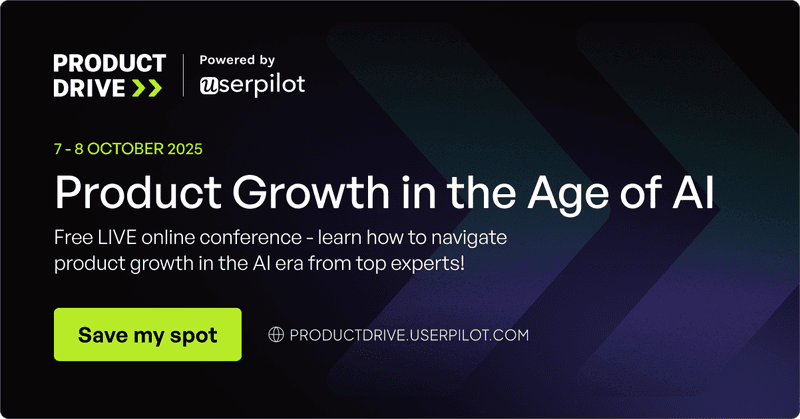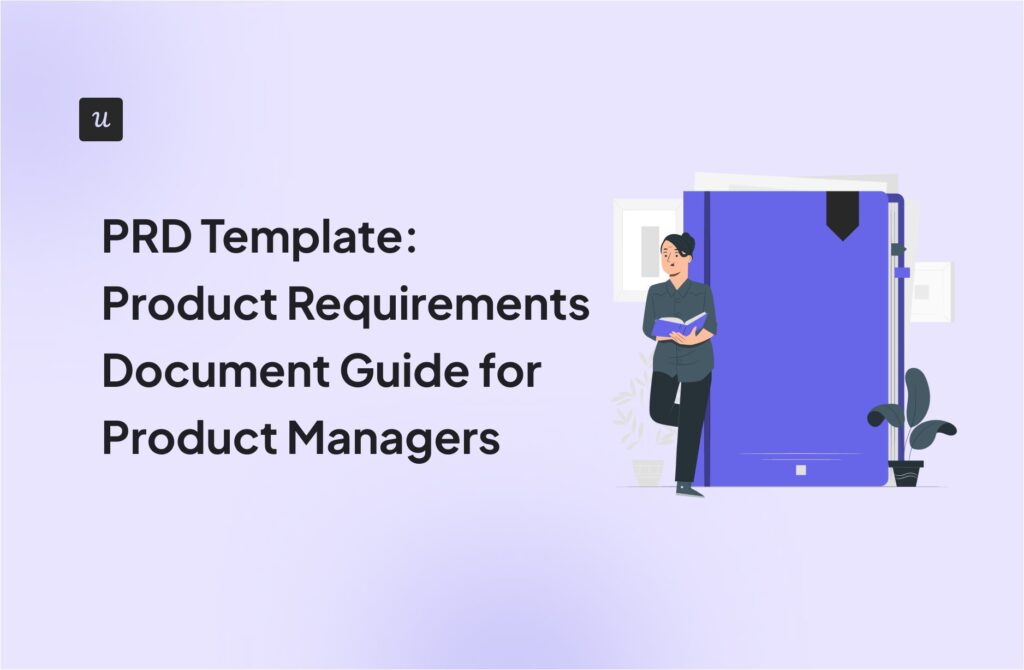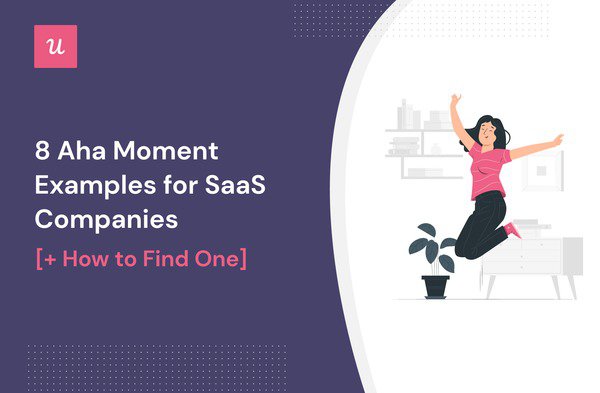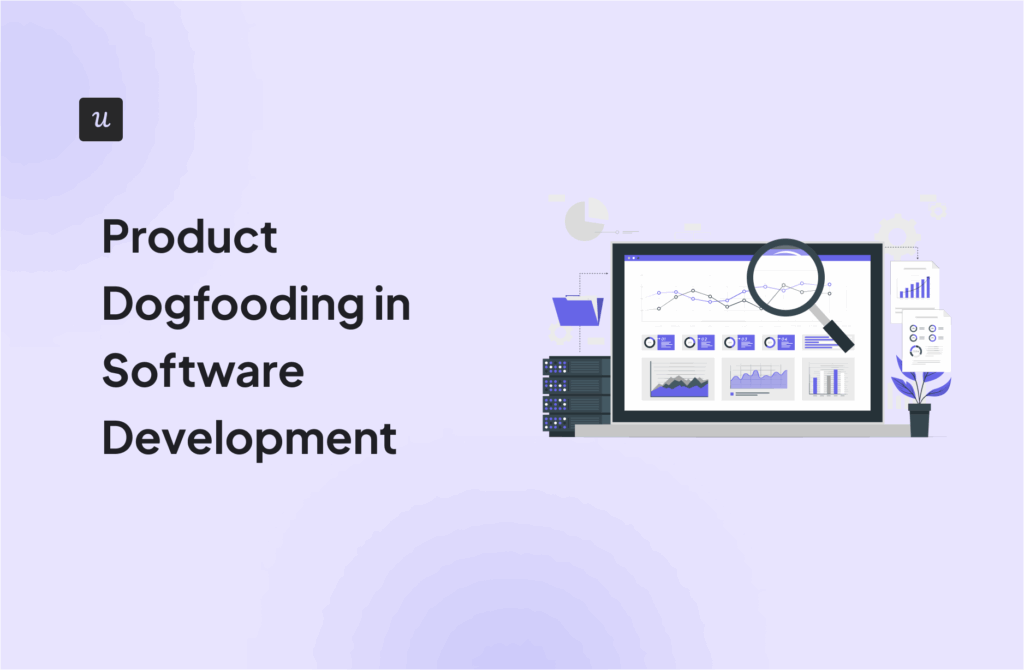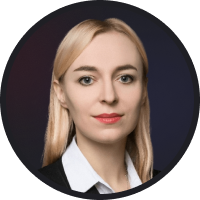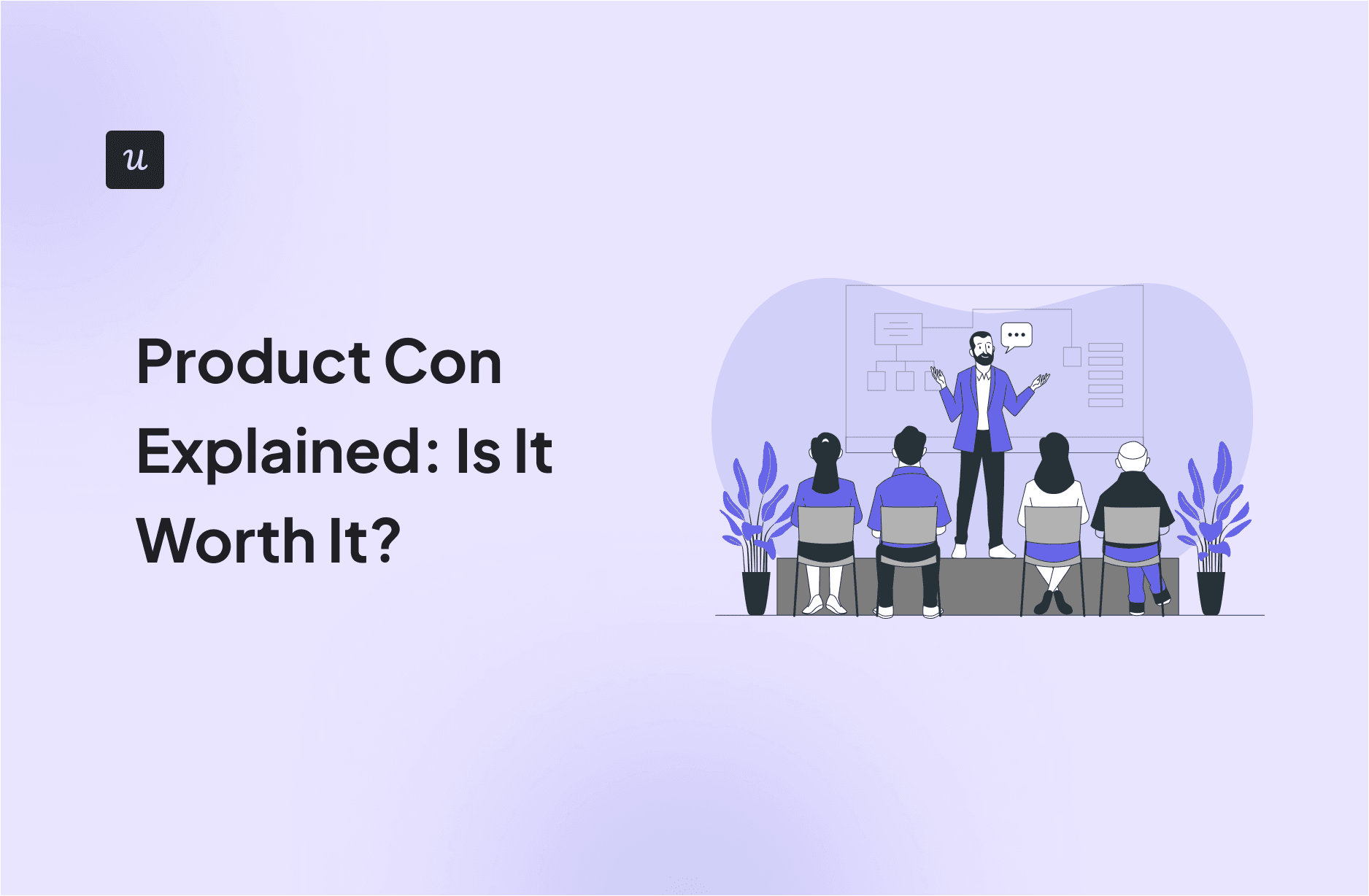
ProductCon is an event organized by Product School, promising to be “the largest product conference in the world.”
But as we’ll see, this conference is part of a larger ecosystem of content that leads to paid certifications. Is ProductCon actually worth it for learning product management?
Let’s break down everything you need to know about ProductCon and compare it with a free alternative (Product Drive) that might provide the same level of value, if not more.
Try Userpilot Now
See Why 1,000+ Teams Choose Userpilot

ProductCon as the largest product management conference
ProductCon is Product School’s flagship conference. It runs four times a year across San Francisco, New York, London, and online. And as explicitly mentioned on their website, its content heavily targets world-class product leaders (e.g., CPOs, VPs, and directors), where you’ll hear exclusive case studies around AI strategy and product leadership.
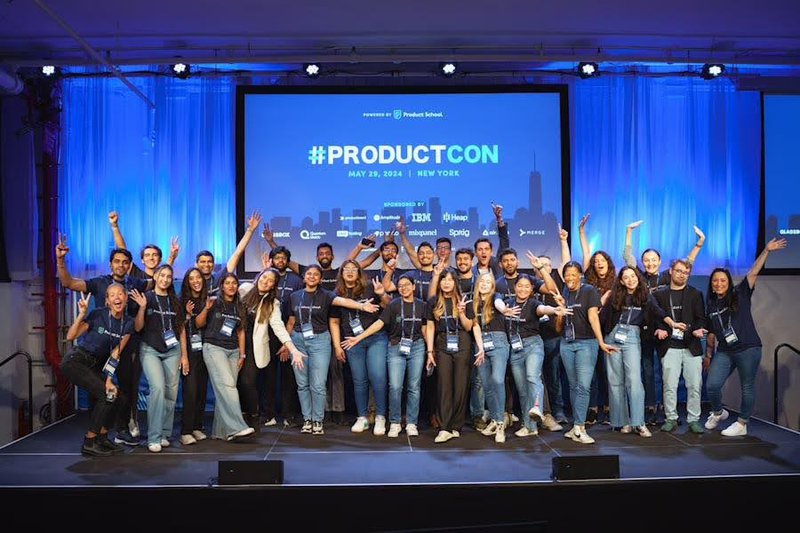
For context, Product School was founded by Carlos González de Villaumbrosia in 2014, after moving from Spain to Silicon Valley.
Carlos started with a simple observation: there was no real school for product management, yet it was becoming one of the most important roles in tech. So, he began hosting meetups in SF and answering questions in forums, eventually turning Product School into an exclusive community with over 2 million product professionals.

Then, ProductCon was launched in 2018 as a community-building effort. But as I’ll explain, it serves more as a lead generation channel for Product School’s certification courses.
ProductCon 2025: The AI executive conference
This year, ProductCon is pivoting into AI, positioning itself as “the AI Conference for Product Leaders.” All the events are now designed around high-level AI strategies for top product executives and world-class networks, shaping the new rules for product management.
The ProductCon New York (May 21) featured 1,000 global leaders and 10,000 online attendees. Yet, the AI-related shows only included:
- Penny Szeto’s (Head of Product at Amazon Games) talk on “building a defensible AI strategy.”
- A panel discussion around deploying AI agents in product teams. Featuring Product VPs from Homes.com, Sendbird, Amplitude, and Contentsquare.
Other product leaders joined from the most innovative companies, including Dave Bottoms (Upwork), Mamuna Oladipi (Shopify), and Tim Holley (MyFitnessPal). But, they were more focused on leading the product at the board, thinking like a general manager, and leading without micromanaging.
That said, this conference didn’t seem to focus on “AI-driven innovation” and treated it like another topic. Other than that, the rest of the talks are extremely high-level, only talking about working with the board and managing product teams.
All of this means you won’t get tactical implementation guides. ProductCon doesn’t tell you how to actually build AI features, measure their impact, or implement growth loops that work for smaller teams.
Who are the main speakers at ProductCon 2025?
The ProductCon San Francisco conference is on October 8. And unlike the NY conference, there will be more talks about AI in product management, including:
- Elena Verna on how to build an answer engine optimization moat. She’ll explain how to adapt to the rise of AI-powered answer engines and secure visibility.
- Carlos Gonzalez on transforming your product team from AI-curious to AI-native. He’ll provide a roadmap to set up agents, governance, and human talent to drive revenue and reduce costs.
- Aparna Sinha (SVP of Product at Vercel) on how to ship products faster with AI. She’ll outline the practices to increase velocity with AI without compromising safety.
- Jeetu Patel (CPO of Cisco) on how to ensure security when adopting AI. He’ll dive into setting accountability frameworks to align teams around security-by-design.
The other speakers are also senior industry leaders from the most influential tech companies. They include Dylan Field (CEO of Figma), Rob Seaman (CPO of Slack), Lisa Kamn (Dow Jones), Tim Simmons (SVP of Product at Walmart), Andrey Khusid (CEO at Miro), and Rachel Obstler (SVP of Product at ContentSquare).
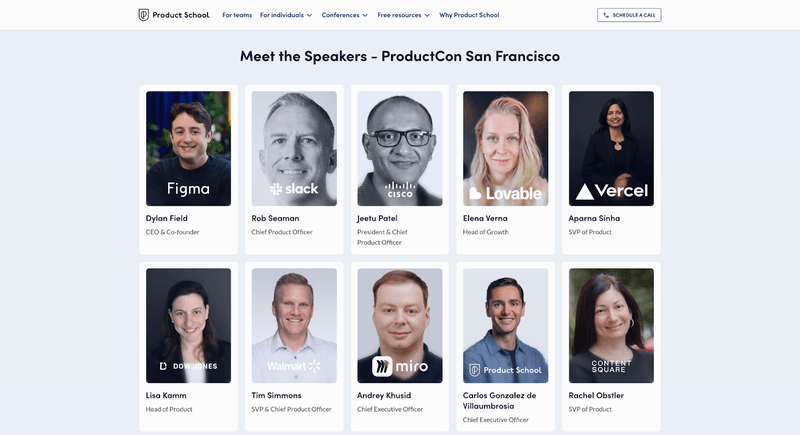
The product school business model
Although ProductCon does bring impressive speakers with inspiring talks, it’s not meant to be an educational event. Actually, Product School’s core business is selling certifications in Product Management, Product Leadership, AI Product Management, and Product Marketing.
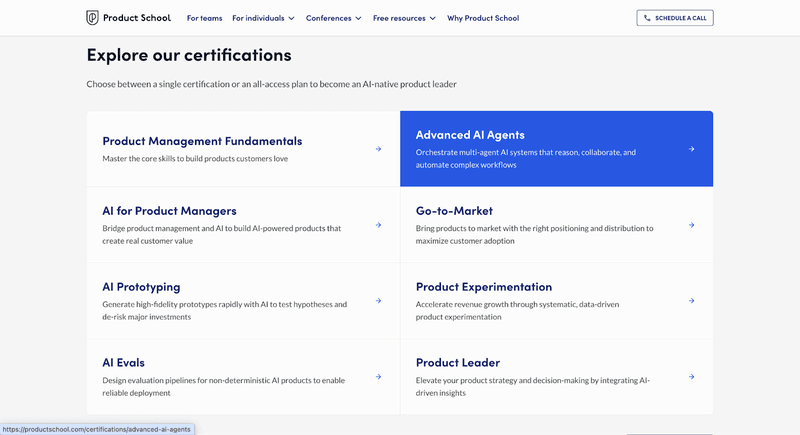
This product training creates an ecosystem where you’re highly incentivized to buy the courses to learn product management in depth. It also incentivizes the conference topics to stay high-level and never focus on applicable, advanced strategies.
Even if your company sponsors these certifications, they probably won’t teach you much more than what you already know. According to the majority of people in product communities, these courses are basic at best, overpriced ($4,000+), and filled with students who are just looking for a job. They claim that the classes are not well-structured, the content path depends on the instructor, and that 30% of the course involves working on a fictional company with pre-made scenarios (instead of building a real product).
The only way for this course to be valuable is if you get sponsored, you have zero knowledge about marketing/business, and you get lucky with a good instructor.
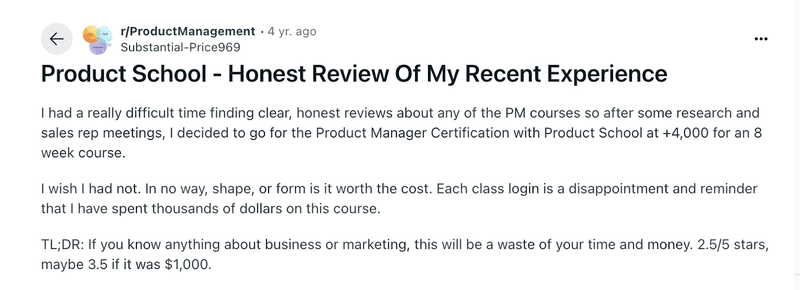
This is why attending ProductCon is conflicting. It’s good if you’re already a senior-level CPO who doesn’t mind the costs and can easily travel.
However, the content isn’t thought for the product manager working in the trenches at a smaller startup, nor for people making their way into the industry. It pressures you to take overpriced courses, and the networking opportunities are limited in a place with thousands of people.
The real cost of ProductCon
Product Con tickets are not cheap. The general ticket is $999.99 (with early bird tickets at a $200 discount), and there’s a group discount that only exists to incentivize whole product teams to go.
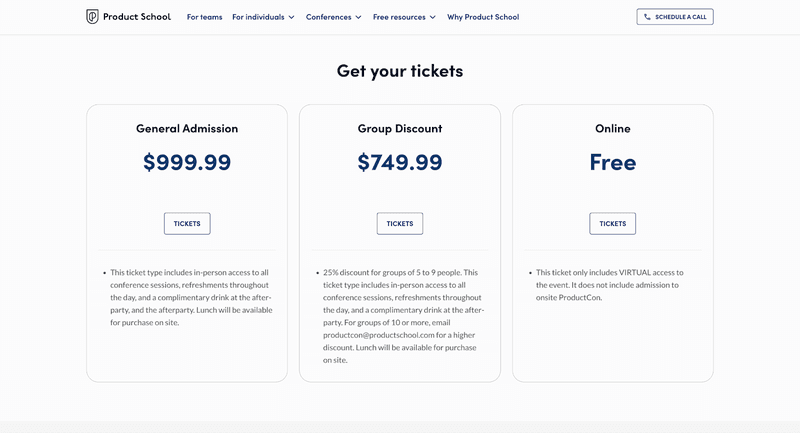
If you’re not in San Francisco, New York, or London, then you must add the cost of flights, hotels, meals, and time off work. Depending on where you live, this can easily increase the budget by a couple of thousand.
As for the free online ticket, it’s just watching the conference live along with tens of thousands of people. All of them are talking, commenting, or asking questions at the same time, with zero opportunities to do any networking.
Who ProductCon actually serves
ProductCon explicitly targets senior product leaders, CPOs, Directors, SVPs of Product, and CEOs. If you’re not at that level, the content will feel disconnected from your reality.
The case studies assume you have massive teams, unlimited budgets, and enterprise-scale problems. The product frameworks are built for Fortune 500 companies, not the startups where most product people work.
The networking happens during breaks and the after-party. But you’ll notice that the only ones who do meaningful networking are the C-suite executives and decision-makers. A regular PM will hardly make a connection when there are 1,000+ people accumulated in one place.
Is there any similar event to ProductCon but better?
Product Drive doesn’t try to do the same as ProductCon, but I believe it’s a better alternative for most product people.
When we started developing Product Drive, we decided to prioritize serving the product community over making revenue. Here’s how:
- We made it completely free. Not “free with premium upgrades” or “free but you can’t interact.” The biggest barrier to learning shouldn’t be your ability to pay conference fees or convince your manager to approve travel expenses.
- It’s designed for a smaller scale. ProductCon packs thousands of people into auditoriums where meaningful interactions are impossible. We cap each Product Drive session at 500 people specifically so the Q&A feels more like a real conversation, not a lottery.
- It focuses on practical implementation. We don’t try to inspire you with platitudes like “put your customers first”. Instead, we show Kate Syuma sharing her step-by-step process for holistic onboarding.
- We brought the brightest minds using AI. Hear directly from speakers like Andrea Saez, Maja Voje, and Kyle Poyar, who are all implementing AI growth strategies right now (not just talking about them at a strategic level). Their talks focus on frameworks you can apply at work, such as how to monetize AI products or how to leverage AI Agents for GTM.
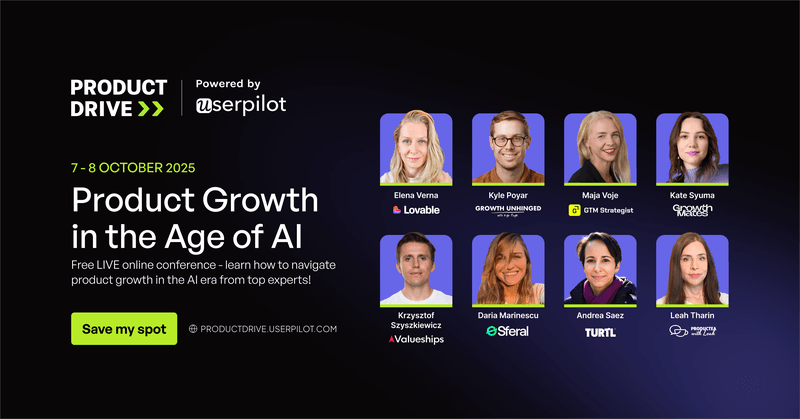
The conference runs October 7-8, entirely online and free. We’re limiting seats to maintain a more intimate experience, but we’re not limiting access based on your job title or your company’s training budget. Every session includes a live Q&A, and with only 500 people per session, your questions are very likely to be answered.
ProductCon or Product Drive? The choice is yours!
If you’re a CPO at a Fortune 500 company who’s already scaling global platforms, ProductCon might be a valuable experience.
But if you’re a product manager trying to figure out how AI actually impacts your day-to-day work, then Product Drive might provide the tools you need to level up at your job.
So if you want to attend Product Drive, save your spot to get the practical AI growth insights and meet innovators who are moving the industry forward.
